 There’s a fair chunk of spectrum that’s sitting there not being used in the 2GHz band. The various bits are 2500-2690 MHz, 2010-2025 MHz and 2290-2300 MHz.
There’s a fair chunk of spectrum that’s sitting there not being used in the 2GHz band. The various bits are 2500-2690 MHz, 2010-2025 MHz and 2290-2300 MHz.
Ofcom has a duty to ensure spectrum isn’t wasted and as a consequence of the auction will end up driving revenue for the Government. Previously, and famously they did very well when they auctioned the 3G licenses, raising £21bn for the Treasury.
They recently auctioned some GSM spectrum and that only raised £3.8m, but it was much less than the 3G lot with many more restrictions.
Under its new face, and following EU directives, Ofcom likes to offer technology neutral licenses, which means the licensee can use the spectrum for whatever they want – as long as they meet the radio restrictions on that band (power, spectral masks, etc). They hope this will stimulate innovative services which is good for the economy.
There’s a lot of interest in the spectrum, as it could be used for lots of services including 3G and WiMAX, but that’s where the problems start.
Possible European Interference
There are various blocks of spectrum which are coordinated at a European level and each EU country uses the spectrum for the same things. That’s pretty much what happens for GSM and 3G, as well as some TV and radio bands.
It’s all organised by CEPT (European Conference of Postal and Telecommunications) and the Radio Spectrum Committee (RSC), CEPT is represented by 47 countries and the RSC by 25 EU states. They ensure that radio usage is coordinated. Unfortunately radio waves don’t abide by national borders, so it would be no good if one country was using spectrum for say TV and another for radio as they’d interfere with each other.

Though the UK is an island, interference issues are quite common, especially in the south east with France and the north east with the Dutch and even the Nordic countries. The west has to worry about Ireland (and of course Northern Ireland abides by UK policy).
These particular bands are already allocated for 3G, 10MHz in 2010 – 2020 MHz, is already designed for license-exempt self-provided, self-coordinated IMT-2000 use. In the UK none of the 3G networks have actually utilised it, though in other parts of Europe it has been used for this purpose.
2500 – 2690 MHz is currently mainly used for video broadcast systems, all licensees have been given notice to vacate by 31st December 2006. This is a significant amount of spectrum (190MHz) which is greater than is currently allocated to the whole of 3G use (140MHz). It was reserved for a “new” entrant if the current 5th 3G operator failed or for existing 3G expansion.
Ofcom’s suggestions summarised
Ofcom are currently holding UK consultations to see what stakeholders think should happen. They are proposing the following: –
2500-2690 MHz Packaged on the basis of blocks of 5 MHz as lots of paired spectrum (2×5 MHz, 120 MHz duplex spacing) and unpaired spectrum (5 MHz), with the eventual amount of lots in each category to be determined in the auction. The reference point is as per the CEPT band plan: 14 lots of paired channels (14x2x5 MHz with uplink in 2500-2570 MHz and downlink in 2620-2690 MHz) and 9 lots of unpaired channels (9×5 MHz in 2570-2615 MHz).
One guard channel will be necessary at adjacencies between paired and unpaired spectrum, at 2615-2620 MHz, and possibly another in the top part of the band.
There is a possibility to allow paired lots to be converted into the equivalent of two unpaired lots in the event that demand for unpaired lots exceeds that for paired lots at a given lot price.
Each bidder should receive contiguous lots in each category, except potentially one assignment of unpaired spectrum which could need to be split into two blocks of contiguous lots.
2010-2025 MHz Package for award as a single 15 MHz lot.
2290-2302 MHz Package for award as a single 10 MHz lot and retain 2300-2302 MHz for possible inclusion as part of a future award together with 2302-2310 MHz.
What might the response be?
The consultation will close in March 2007 and it’s likely the 3G operators will be extremely vocal in their claim to this spectrum, as they paid so much for their original licenses.
Once Ofcom digest the responses, they’ll then have to argue the case at the European level to ensure it can be licensed off in a technology neutral manner without upsetting our neighbours, however getting agreement from at least 47 countries tends to be a time consuming process.
Luckily CEPT are already discussing the issues and are expecting to make a statement in July next year. RSC will follow shortly after.
Although there’s no guarantee that discussions will go in Ofcom’s favour, they are hoping an award process can start in the Autumn of 2007, though it may well be delayed until 2008.
Potential Cash
With 16 national licenses available, there’s a fair amount of cash the government can expect to raise. Even if Ofcom set the minimum price at £50,000 then that’s £800,000 – they are likely to reach much higher values, although not the silly pricing that the original 3G licenses fetched.
Ofcom
CEPT (European Conference of Postal and Telecommunications)
Radio Spectrum Committee (RSC)
 It’s all about their RANs – Radio Access Networks, which connect customers mobiles to the operators networks.
It’s all about their RANs – Radio Access Networks, which connect customers mobiles to the operators networks. There’s a fair chunk of spectrum that’s sitting there not being used in the 2GHz band. The various bits are 2500-2690 MHz, 2010-2025 MHz and 2290-2300 MHz.
There’s a fair chunk of spectrum that’s sitting there not being used in the 2GHz band. The various bits are 2500-2690 MHz, 2010-2025 MHz and 2290-2300 MHz.
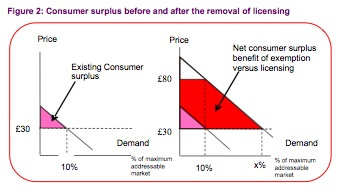
 In an ideal world, waiting near the top of the new OFCOM boss Ed Richards’ in-tray, there should be a folder marked ‘Sky Monopoly’ and on it a brightly coloured post-it with the words anti competitive clearly inscribed.
In an ideal world, waiting near the top of the new OFCOM boss Ed Richards’ in-tray, there should be a folder marked ‘Sky Monopoly’ and on it a brightly coloured post-it with the words anti competitive clearly inscribed. The area where Sky has decided not to use DVB is for its Conditional Access encryption.
The area where Sky has decided not to use DVB is for its Conditional Access encryption.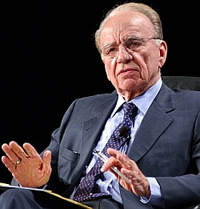 If that TV service then wants to charge the subscribers to their service they have to use that special version of Videoguard CA.
If that TV service then wants to charge the subscribers to their service they have to use that special version of Videoguard CA. Ofcom has announced that Ed Richards is taking over the uber-communications agency CEO reigns, effective today.
Ofcom has announced that Ed Richards is taking over the uber-communications agency CEO reigns, effective today. * Ensuring that Ofcom’s voice is heard on key issues. Ofcom to its credit, tend to think and act in an evidence-based manner, but are surrounded by a regulatory environment which is highly politicised. This has been particularly true in both the media and new media, an area where Stephen Carter’s Ofcom often produced good thinking, but was unable to translate that into actual policy (eg, BBC charter review). Richards comes from the political world, and this might benefit Ofcom in that respect.
* Ensuring that Ofcom’s voice is heard on key issues. Ofcom to its credit, tend to think and act in an evidence-based manner, but are surrounded by a regulatory environment which is highly politicised. This has been particularly true in both the media and new media, an area where Stephen Carter’s Ofcom often produced good thinking, but was unable to translate that into actual policy (eg, BBC charter review). Richards comes from the political world, and this might benefit Ofcom in that respect. The UK’s broadcasting and telecommunications regulator OFCOM last week made clear its opposition to potential EU regulation. It fears it will straight-jacket the emerging new wave industries aiming to propel high tech growth in the EU zone over the coming years.
The UK’s broadcasting and telecommunications regulator OFCOM last week made clear its opposition to potential EU regulation. It fears it will straight-jacket the emerging new wave industries aiming to propel high tech growth in the EU zone over the coming years. The study also makes clear its’ worries that excessive regulation could mean that countries outside of the EU would benefit from the expected growth in non traditional delivery of multimedia content, before it has established itself in Europe.
The study also makes clear its’ worries that excessive regulation could mean that countries outside of the EU would benefit from the expected growth in non traditional delivery of multimedia content, before it has established itself in Europe.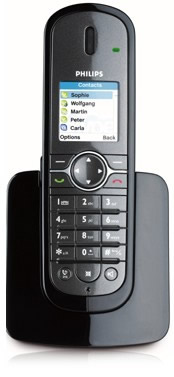 The news that OFCOM is to review its position on Voice Over IP services (VOIP) – the way we can make low cost or free phone and video calls currently from our PC’s generally using call centre-type headsets – is part of the evolution of these types of service from guerrilla geek to middle class mainstream. Now that Tesco’s are marketing VOIP services it’s fair to say that it’s a ‘regular’ service/product.
The news that OFCOM is to review its position on Voice Over IP services (VOIP) – the way we can make low cost or free phone and video calls currently from our PC’s generally using call centre-type headsets – is part of the evolution of these types of service from guerrilla geek to middle class mainstream. Now that Tesco’s are marketing VOIP services it’s fair to say that it’s a ‘regular’ service/product. Prices for the new device are not yet released, but industry observers are talking of a figure around a £100 to make this potentially cost saving purchase.
Prices for the new device are not yet released, but industry observers are talking of a figure around a £100 to make this potentially cost saving purchase.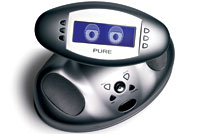 DAB in the UK has had a good week with prices dropping to an all time low, with High Street retailers are now making available a DAB radio with CD player for under £50.
DAB in the UK has had a good week with prices dropping to an all time low, with High Street retailers are now making available a DAB radio with CD player for under £50.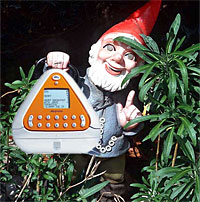 Sky’s satellite hybrid
Sky’s satellite hybrid 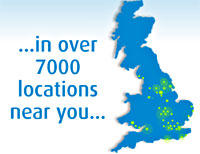 UK regulator Ofcom is looking at plans to introduce high speed Internet access to broadband-starved remote areas by boosting the power of Wi-Fi signals.
UK regulator Ofcom is looking at plans to introduce high speed Internet access to broadband-starved remote areas by boosting the power of Wi-Fi signals. City networks
City networks Ruckus, who are currently working with Google to test a free mesh network in Mountain View, California, have developed a new Wi-Fi antenna to help home users connect to city networks.
Ruckus, who are currently working with Google to test a free mesh network in Mountain View, California, have developed a new Wi-Fi antenna to help home users connect to city networks. Ofcom has just issued guidance that GPS repeaters are probably illegal in the UK, both in their use and their sale.
Ofcom has just issued guidance that GPS repeaters are probably illegal in the UK, both in their use and their sale.